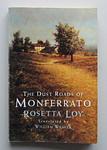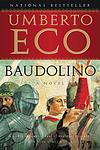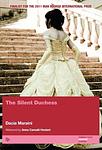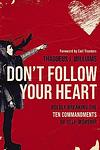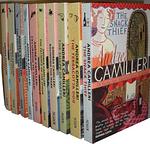The Greatest Italian "Fiction" Books Since 1990
Click to learn how this list is calculated.
This list represents a comprehensive and trusted collection of the greatest books. Developed through a specialized algorithm, it brings together 280 'best of' book lists to form a definitive guide to the world's most acclaimed books. For those interested in how these books are chosen, additional details can be found on the rankings page.
Genres
Countries
Date Range
Reading Statistics
Click the button below to see how many of these books you've read!
Download
If you're interested in downloading this list as a CSV file for use in a spreadsheet application, you can easily do so by clicking the button below. Please note that to ensure a manageable file size and faster download, the CSV will include details for only the first 500 books.
Download-
1. My Brilliant Friend by Elena Ferrante
This novel tells the story of two friends, Elena and Lila, growing up in a poor neighborhood in Naples, Italy in the 1950s. Their intense, complicated friendship is marked by competition, mutual respect, and deep affection. As they navigate the challenges of adolescence, including family drama, academic struggles, and romantic entanglements, their bond is tested and transformed. The narrative explores themes of female friendship, social class, education, and the struggle for personal autonomy in a patriarchal society.
-
2. Silk by Alessandro Baricco
"Silk" is a historical fiction novel that tells the story of a 19th-century French silkworm merchant who travels to Japan for business. During his travels, he becomes enamored with a mysterious woman. His unrequited love for her haunts him for the rest of his life, even as he returns to France and continues his life there. The novel explores themes of love, longing, and the profound impact that brief encounters can have on one's life.
-
3. Troubling Love by Elena Ferrante
This novel follows a woman who returns to Naples after her mother's mysterious death, determined to understand the enigmatic life her mother led. As she delves into her mother's past, she uncovers a web of secrets and discovers more about her own identity in the process. The narrative explores themes of mother-daughter relationships, identity, and the power of the past.
-
4. Pereira Maintains by Antonio Tabucchi
"Pereira Maintains" is a novel set in the backdrop of 1938 Portugal during the fascist dictatorship of Antonio de Oliveira Salazar. The narrative follows Pereira, a widowed, overweight editor of the culture section of a second-rate Lisbon newspaper, who becomes politically awakened after meeting a young anti-fascist. As he grapples with his conscience, he risks everything to help his new friend and his pregnant girlfriend escape to safety. The story is a compelling exploration of the struggle for moral integrity in a climate of political oppression.
-
5. I'm Not Scared by Niccolò Ammaniti
Set in a small Italian village during the scorching summer of 1978, this novel tells the story of a 9-year-old boy who discovers a horrific crime being hidden by the adults in his community. The boy, while exploring an abandoned farmhouse, stumbles upon a young boy being held captive in a hole. As he tries to help the captive boy, he is forced to face the moral complexities of his world and the terrifying realization that his own father might be involved in this cruel act. The story is a poignant exploration of innocence, friendship and the loss thereof, and the harsh realities of adulthood.
-
6. The Dust Roads Of Monferrato by Rosetta Loy
Set against the backdrop of rural Italy, the novel weaves a rich tapestry of family saga and historical transformation. It follows the lives of several generations of a family in the Monferrato region, as they navigate the tumultuous changes of the 20th century. Through wars, social upheaval, and personal trials, the characters' stories intertwine with the dusty roads of their homeland, painting a vivid portrait of a community bound by tradition yet facing the inevitable march of progress. The narrative delves into themes of memory, identity, and the enduring impact of the past on the present, all while celebrating the beauty and resilience of the Italian countryside.
-
7. Baudolino by Umberto Eco
Set in the 12th century, the novel follows Baudolino, a self-proclaimed liar and adventurer, as he travels from his home in Italy to the mythical kingdom of Prester John. Along the way, he becomes embroiled in a series of political and religious intrigues, meets a variety of fantastical creatures, and tells a series of increasingly elaborate lies. The narrative is framed as a story Baudolino is telling to a Byzantine historian, adding another layer of unreliability to his already questionable narrative.
-
8. The Silent Duchess by Dacia Maraini
This novel is a poignant exploration of the life of an 18th-century Sicilian noblewoman, born into privilege yet silenced by a congenital disability. Through her eyes, readers experience the constraints and expectations placed on women of her time, navigating a world where her voice is metaphorically and literally stifed. Despite the limitations imposed by her society and her own family, she embarks on a journey of self-discovery and defiance, seeking love, intellectual fulfillment, and a sense of identity within the opulent yet oppressive confines of her aristocratic life. The narrative delves into themes of power, gender, and the quest for personal freedom, painting a vivid picture of historical Sicily and the resilience of the human spirit.
-
9. The Neapolitan Novels by Elena Ferrante
"The Neapolitan Novels" is a four-part series that explores the intricate and lifelong friendship between two women from Naples, Italy. The series spans several decades, beginning in the 1950s, and provides a detailed examination of the women's lives, struggles, and the societal pressures they face. The narrative delves into themes of identity, friendship, love, violence, and socio-political changes in post-war Italy. The series is known for its rich character development and vivid portrayal of female friendship.
-
10. Call Me By Your Name by André Aciman
The novel is a poignant exploration of desire, passion, and the confusion of young love, set during a sun-drenched summer on the Italian Riviera. It follows the blossoming romantic relationship between a precocious 17-year-old boy and a visiting 24-year-old American scholar staying at his parents' villa. As they bond over literature, music, and the languid Italian landscape, their intimacy grows, leading to a deep and transformative affair that will leave an indelible mark on their lives. The story delves into the complexities of emotions and the heartache of remembering a once-in-a-lifetime connection that both defines and haunts them.
-
11. Follow Your Heart by Susanna Tamaro
"Follow Your Heart" is a poignant epistolary novel that delves into the themes of self-discovery, family secrets, and the unbreakable bonds between generations. The story unfolds through a series of letters written by an elderly Italian woman to her granddaughter, who has moved to America. In these letters, she shares her life's wisdom, reflects on her past experiences, and reveals long-held secrets. The narrative explores the choices she made, the consequences of those choices, and the lessons she learned along the way. It is a heartfelt meditation on love, loss, and the importance of following one's own heart in the face of societal expectations and personal doubts.
-
12. Ocean Sea by Alessandro Baricco
In this lyrical and atmospheric novel, the lives of several characters converge at a remote seaside inn, where the ocean serves as a backdrop to their intertwined stories. The narrative weaves together the tales of a cast that includes a grieving widower, a troubled artist, and a mysterious woman, among others, each drawn to the sea for different reasons. The sea itself becomes a central character, representing the vast and unknowable depths of human emotion and experience. Through poetic prose and philosophical musings, the novel explores themes of love, loss, and the eternal quest for meaning in a world that is both beautiful and cruel.
-
13. Novecento by Alessandro Baricco
The book is a poignant monologue that tells the story of a gifted pianist born on a transatlantic liner in the early 20th century. Abandoned at birth, he is named after the year of his birth and grows up on the ship, never setting foot on land. His extraordinary talent for piano captivates everyone who hears him play, and his music becomes legendary among travelers and crew alike. The narrative, recounted by a fellow musician and friend, explores themes of belonging, the meaning of home, and the transcendent power of music to connect people across the boundaries of time and space.
-
14. City: A Novel by Alessandro Baricco
"City: A Novel" unfolds as a multi-layered narrative that weaves together the lives of various characters, including a precocious child prodigy, a boxer, and a soldier, all residing in an unnamed, dreamlike metropolis. The novel explores themes of isolation, the search for meaning, and the intersection of reality and imagination. Through a series of interconnected stories and a blend of genres, the book creates a tapestry of human experience, reflecting on the nature of cities as spaces where diverse lives converge and the extraordinary can emerge from the mundane.
-
15. Journey To The Land Of Flies And Other Travels by Aldo Buzzi
This book is a collection of travel essays that take readers on a whimsical and insightful journey through various parts of the world. The author, with a keen eye for detail and a taste for the eccentric, shares his experiences and observations from his travels, ranging from the titular land of flies to the bustling streets of New York and the serene landscapes of Europe. His writing is infused with a mix of humor, reflection, and a deep appreciation for the cultures and cuisines he encounters, making this work a delightful read for those who enjoy literary travelogues and the exploration of foreign places through the eyes of a perceptive and thoughtful wanderer.
-
16. Acqua Alta by Donna Leon
In this gripping installment of a celebrated mystery series set in Venice, the protagonist, a thoughtful and diligent detective, finds himself embroiled in a complex case that intertwines a brutal attack on a famous opera singer with a sinister burglary at a local museum. As the detective delves deeper into the investigation, navigating the atmospheric and flood-prone streets of Venice, he uncovers a web of deceit, corruption, and long-buried secrets. With the city's unique and treacherous acqua alta (high water) providing both a backdrop and a clue, the detective must use all his skills and local knowledge to solve the case before the rising waters erase all traces of the perpetrator's crimes.
-
17. Born Twice by Giuseppe Pontiggia
The novel centers around a father's profound journey as he navigates the complexities of raising a son with cerebral palsy. The narrative delves into the emotional and social challenges they face, exploring themes of acceptance, resilience, and the redefinition of fatherhood. Through his son's condition, the father confronts his own vulnerabilities and the societal prejudices against disability, ultimately experiencing a profound transformation that leads him to a deeper understanding of love, identity, and the human experience.
-
18. The Story Of The Lost Child: Book 4, The Neapolitan Novels: “Maturity, Old Age by Elena Ferrante, Ann Goldstein
"The Story of the Lost Child" is the fourth and final book in the Neapolitan Novels series by Elena Ferrante. The novel follows the lives of two childhood friends, Elena and Lila, as they navigate through adulthood, motherhood, and old age in Naples, Italy. The book explores themes of class, gender, motherhood, and the complexities of female friendships. As the two women grow older, they face challenges that test their friendship and force them to confront the choices they have made in their lives. The novel is a poignant and powerful conclusion to the Neapolitan Novels series.
-
19. August Heat by Andrea Camilleri
In "August Heat," readers are plunged into the sweltering Sicilian summer, where Inspector Montalbano finds himself grappling with a particularly perplexing case amidst the oppressive heat. The story unfolds as Montalbano seeks refuge in a beach house to escape the scorching temperatures, only to stumble upon a perplexing mystery involving a murdered girl and a labyrinthine villa that hides more than just family secrets. As he delves deeper, the inspector must navigate a complex web of deceit, passion, and betrayal, testing his detective skills to their limits. This installment of the beloved series combines a gripping mystery with the rich, evocative setting of Sicily, showcasing the inspector's sharp wit and the local flavors of the island.
Reading Statistics
Click the button below to see how many of these books you've read!
Download
If you're interested in downloading this list as a CSV file for use in a spreadsheet application, you can easily do so by clicking the button below. Please note that to ensure a manageable file size and faster download, the CSV will include details for only the first 500 books.
Download




